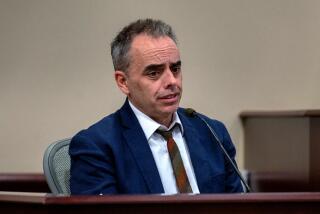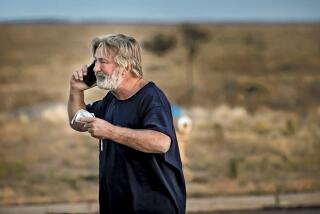Colorado massacre hearing: Trail of blood led to ‘detached’ suspect
CENTENNIAL, Colo. — James E. Holmes was arrested without incident on the night of a bloody rampage in a suburban movie theater, but he appeared emotionally detached and uninvolved, police testified on Monday as the prosecution began a weeklong preliminary hearing that promised to offer the deepest public view of its case against the former graduate student.
Officer Jason Oviatt, who discovered Holmes behind the movie theater, was first to testify in the preliminary hearing, the latest step in the proceedings against the 25-year-old former neuroscience student accused of 166 criminal counts including murder and attempted murder. Holmes is charged with killing 12 people and injuring at least 70 in a July 20 attack inside the Aurora theater during a midnight showing of the Batman movie “The Dark Knight Rises”
Holmes seemed “very detached from it all,” Oviatt said. “It’s like there weren’t normal emotional reactions.”
PHOTOS: Colorado movie theater shootings
The hearing is a proceeding to determine whether the prosecution’s evidence will lead to a trial. It is one step in what is expected to be a lengthy legal process, which is less about whether Holmes was the gunman and more about what punishment he might face. The defense is expected to argue that Holmes’ mental state prevents him from being executed.
In the first testimony, police painted a portrait of a detached suspect moments after the first emergency calls to authorities. Oviatt, the first officer to encounter Holmes, said he thought the suspect was another officer because he was wearing a helmet, body armor mask and a gas mask.
WHO THEY WERE: Aurora theater shooting
Oviatt said Holmes was standing still outside an emergency exit of the theater, beside a white car, with his hands on top of the hood, where a semi-automatic weapon lay. “He was just standing there, not excited, not urgent,” he said.
Oviatt said he realized that the person he saw was not an officer. Oviatt, who said he had “followed a trail of blood” to the rear of the theater, drew his gun, put Holmes on the ground, and tried to search him for other weapons. Additional officers arrived and cut off the body armor and clothes.
In all, officials have said they recovered an assault rifle by the theater door and magazines of ammunition in his pockets.
Oviatt and Officer Aaron Blue, who was the second person on the stand, testified that Holmes said that his apartment had been rigged with “improvised explosive devices” that would explode if tripped.
Blue also testified about holding Jessica Ghawi, one of those killed, in the back of his car as another officer drove them to the hospital. “Every time she moved, she stopped breathing,” Blue said.
The hearing is the first extensive public disclosure of the evidence against Holmes. Three days after the shooting, District Judge William Sylvester blocked lawyers on both sides from discussing the case publicly. In addition, many court documents have been filed under seal.
Holmes’ attorneys have told the court that Holmes is mentally ill, but they have not said whether they plan to employ an insanity defense. Defense lawyers have said they plan to call at least two people this week who can testify about Holmes’ mental health.
ALSO:
Tow line is attached to beached oil barge off Alaska
Web plays incendiary role in Ohio high school rape case
Father of Aurora shooting victim to attend theater reopening
Special correspondent Deam reported from Colorado; Times staff writer Muskal from Los Angeles.
More to Read
Start your day right
Sign up for Essential California for news, features and recommendations from the L.A. Times and beyond in your inbox six days a week.
You may occasionally receive promotional content from the Los Angeles Times.







